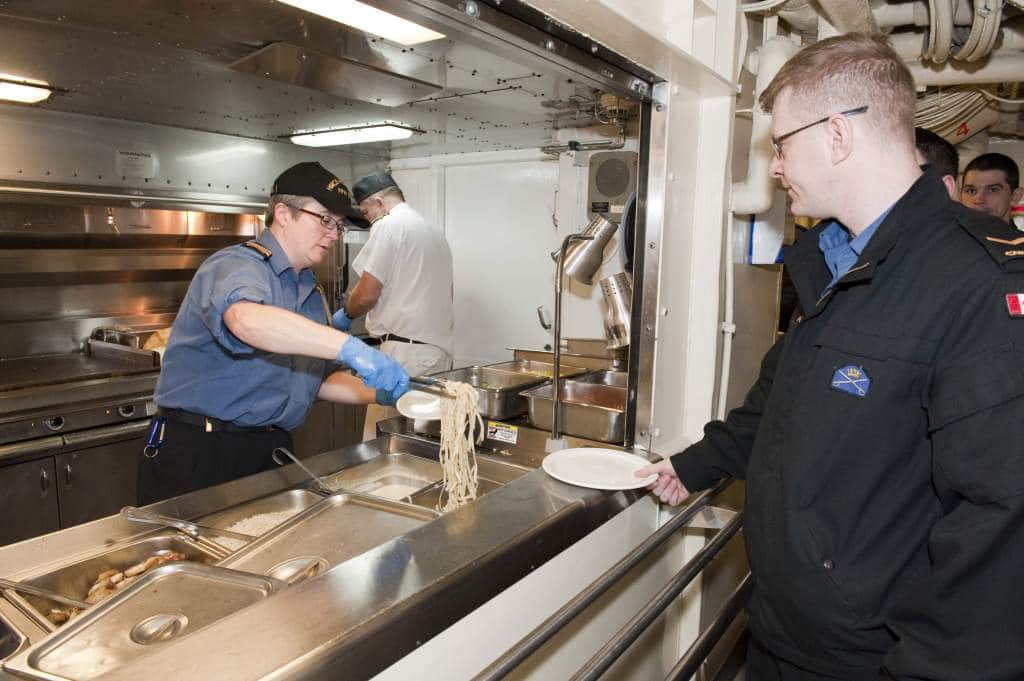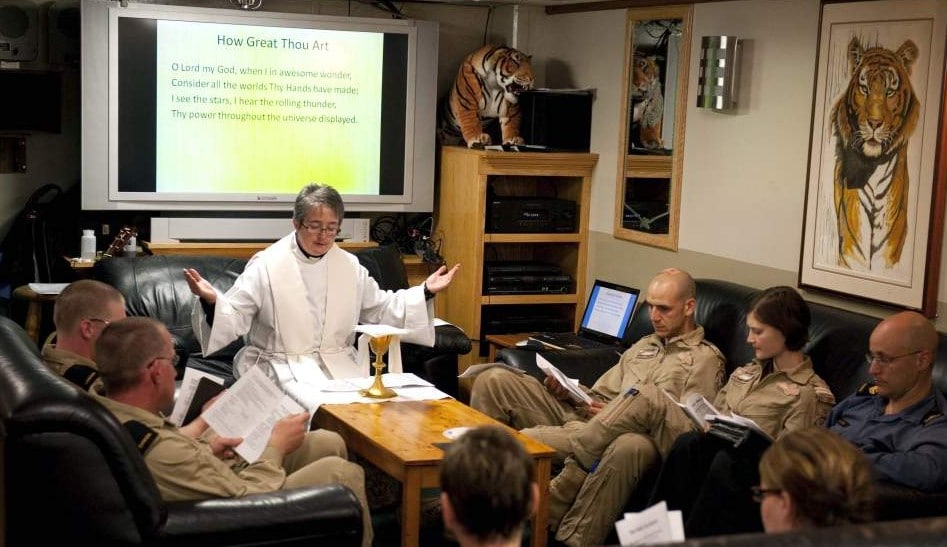by Lieut (Navy) The Rev. Jennifer Gosse
I am a priest from the Diocese of Eastern Newfoundland and Labrador. Until two and a half years ago, all my ordained ministry took place in Labrador as Rector of the parishes of Cartwright and Lake Melville and as Archdeacon of Labrador. From the time I was a child, I knew I was called to ordained ministry. It has always been a part of who I am. It is what I know; it is where I am comfortable. Then suddenly God called me out of that comfortable place, into something I had never even dreamt – ministry with the Canadian Forces (CF).
If you had asked me on my ordination day, would I ever find myself one of Her Majesty’s Canadian Ships (HMCS) celebrating Christmas in the Gulf of Aden, I would have replied with a resounding, “Not in this lifetime!” But here I am because God did as God does: first called and then equipped me for this new and exciting phase in my life. The CF Chaplaincy does a very good job of making the transition from civilian ministry to military ministry as painless as possible. It really was like joining a big, new family. We all know how important our work is to the men and women we serve, and so when someone expresses and interest in joining us, we get very excited, and welcome the new recruit with open arms.
After the application and acceptance process, the first step is Basic Officer Training where a new chaplain is taught the fundamental aspects of military life as well as an introduction to ministry in a military environment. For the next two years the new chaplain’s training continues with Second Language Training, a course in ethics, another in pastoral counseling and then one which prepares you for what I am doing now: Chaplains in Deployed Operations.
I wear the navy uniform and was fortunate to have my first posting with the Navy in Halifax. That means that for my first deployment, I find myself on HMCS Fredericton for six and a half months as she participates in Operation SAIPH, Canada’s contribution to NATO’s counter-piracy and counter-terrorism efforts in the Gulf of Aden and Arabian Sea. After a week of crossing the North Atlantic, and three beautiful port visits in the Mediterranean, including the opportunity to visit Jerusalem, a dream come true for me, we find ourselves patrolling the Gulf of Aden as part of a much larger task group called the Standing NATO Maritime Group 1 (SNMG1). In company with naval vessels from several other countries, we patrol the waters of the International Recommended Transit Corridor, looking for suspicious vessels, responding to distress calls from ships in trouble and keeping the waterways safe for, as our Naval Prayer says, “such as pass on the seas upon their lawful occasions.”
People often wonder what a chaplain does in the CF, especially on a ship where everyone else’s role is so black and white. Where does the chaplain fit? “What do you do all day long?” is one of the questions I hear so often. Actually my work while at sea is not so different from my work in a unit at home. I spend most of my time just being where my people are. Chaplains call this our “ministry of presence.” Military members form very proud, close-knit teams, whether that be in an army unit, an air force squadron or a naval ship. It is hard for those who are outside that entity to be accepted and trusted. The Chaplain must work hard to become someone the average soldier, sailor or airman or woman can trust, and that means being where they are, doing what they do and becoming a familiar face.

Every day I walk around the ship and visit people where they work. I serve lunch in the galley and give the cooks some much welcome relief. I eat in the mess with the junior ranks and listen to the stories of what their families are doing at home. I do PT with the Naval Boarding Party every day as they keep in shape for their unique role in our mission. And when I see someone doing something that “even a Padre” can do, I lend a hand, whether that be carrying supplies aboard ship during a port visit, taping the bulkheads as someone prepares to paint, or helping the people on garbage detail “sort the gash”. I talk with the Chiefs and Petty Officers and provide a sounding board as they deal with problems among their people, and I listen to any advice they have for me, because I assume that someone who has been at sea for almost 30 years probably has a thing or two to teach me. Finally, as Chaplain, I wear the rank of an officer, so I spend time in the Wardroom and talk with other officers about the issues of the day, the never ending training everyone must undergo, and the mission we are all involved in.
The position of Padre is perhaps the most privileged of all because we have access to everyone: from the Ordinary Seaman, the lowest ranking sailor who has just finished training and is experiencing his first deployment, to the Commanding Officer, who carries the responsibility for the 250+ souls onboard, the ship itself and the mission with which we have been tasked. It is my job to keep my ear to ground among the crew so that I can give advice and appropriate recommendations to Command with regard to morale, ethical issues, the spiritual well-being of the members and any compassionate issues that may arise. Thankfully, I have a team of fellow Chaplains at home to rely on, so that when one of my sailors is having problems in her family, I can have a rear-party Padre visit the family, offer counseling, and arrange any other help that may be required.
My priestly ministry, of course, calls me to offer regular worship services for those who wish to attend. Each Sunday a service is held in one of the three Messes and the time alternates weekly. You see, at any given time, about half of the people on the ship are on duty. If church was the same time every week, half of the crew would never be able to attend. As well, the mission always comes first. If a threat arises ten minutes before service is supposed to start, service will happen when the threat has been resolved, later that day or week. Military chaplaincy requires a high degree of flexibility. It means working in an ecumenical and inter-faith environment. I am the only chaplain onboard, so I am responsible to the CO for the spiritual well-being of every person: Christian or Muslim, Roman Catholic or Protestant, atheist or believer. I am called to respect and support every one of my members, no matter where they are in their faith, or their lack thereof. All Christians, regardless of their denomination attend my services, and so as I lead them all in worship, I remain faithful to my own tradition and yet try to offer a worship experience in which everyone can comfortably participate. At the beginning of our deployment I helped arrange a suitable space for a Muslim sailor to do his daily prayers. During the deployment, I have tried to show those who do not believe that the Chaplain’s role is not to force-feed them religion, but to respect their opinions and preferences; my role is spiritual companion, not proselytizer.
I love this ministry and give God thanks every day for the privilege of working among an amazing group of people who put their country and its well-being ahead of themselves and even their families. Please pray that God will continue to call faithful men and women to serve the Canadian Forces, and that those called will have ears to hear and the courage to answer.
Interested in keeping up-to-date on news, opinion, events and resources from the Anglican Church of Canada? Sign up for our email alerts .

